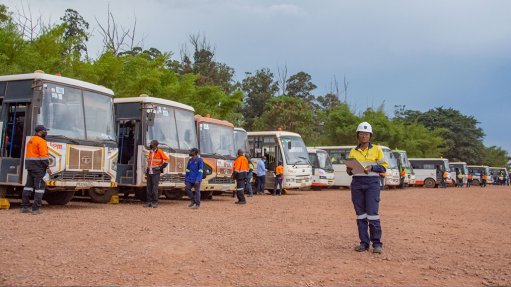
SUCCESS STORY Local supplier who benefited from the EDP, with employee bus transport run by GPM
Diversified miner Glencore’s enterprise development programme (EDP) has created and sustained over 5000 job opportunities in the Democratic Republic of Congo (DRC) since 2019, says Kamoto Copper Company GM of business improvement Ndomba Tshiendela.
“The EDP is aimed at providing business opportunities for businesses in the DRC that are minimum 51%-owned by Congolese nationals. The goal is to create and sustain jobs in the community and contribute to the development of the local economy.”
In 2020, 25% of total expenditure on goods and services was allocated to local businesses of which 5% was allocated to EDP participants. This has grown to 30% and 7% respectively by the end of last year.
Tshiendela adds that, at the programme’s infancy, the EDP team worked with end-users to overcome challenges pertaining to critical skills and turnaround times.
While Glencore was implementing the initiative, the Congolese government established the Contracting Law, requiring companies to contract only with companies that are 51%-owned by Congolese citizens.
This law became “mutually beneficial”, as it enabled the EDP team to work with local businesses to their benefit.
Several cases illustrate the programme’s success, such as agricultural cooperatives that were once small-scale farms that grew into large-scale farms, and entrepreneurs that have become owners of construction and transport companies, “so we have good success stories, owing to the EDP”, adds Tshiendela.
Further, Tshiendela states that implementation of the EDP has not been without challenges such as access to finance, and business administration and critical technical skills.
He says the EDP looks to existing firms to work with smaller companies to address and build those critical skills.
“For example, if there is a major project that a smaller company has tendered for, we task them with collaborating with a larger company on 30% of the project. In this way, smaller businesses work with larger companies on the same project to learn from them.”
Tshiendela says 167 companies have participated in the programme to date, primarily made up of small to medium-sized companies.
Companies that participate are typically hired to focus primarily on work, such as catering, transport, drilling and construction projects, as more communities can be positively impacted on through this labour-intensive approach.
The EDP previously provided one-on-one coaching sessions with companies, but currently provides online training for participants because of the Covid-19 pandemic.
Tshiendela says the EDP aims to offer individual business management training sessions in person from the end of the first quarter of the year.
To successfully complete the programme, companies should aim to generate $5-million a year through the EDP over three years, totalling $15-million.
“Our wish, as a team and a company, is to see businesses complete the EDP and become competitive in the industry, the region and the African continent.”
Tshiendela says the EDP aims to in-source the procurement of goods and services within the DRC to create and sustain local employment.
“We see a great opportunity to help support livelihoods in the DRC and see companies making a positive impact on the country and the Kolwezi region,” he concludes.